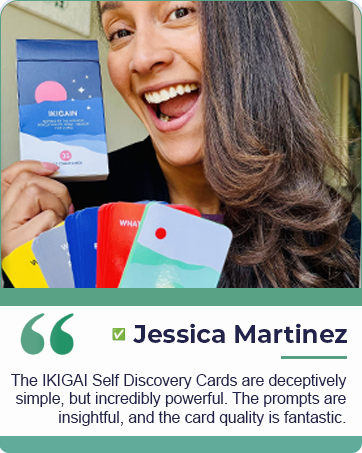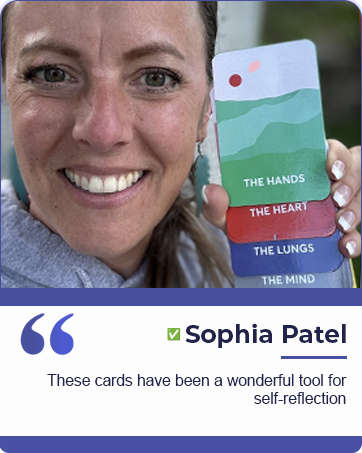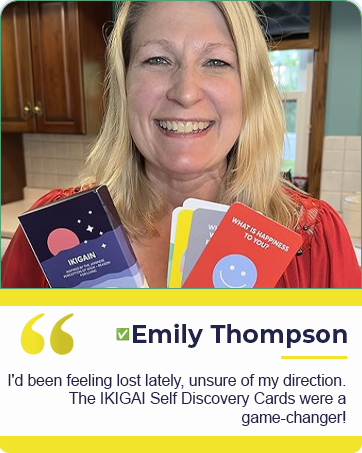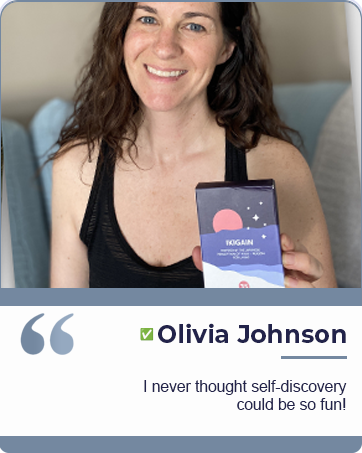What Is Ikigai?
Ever feel like you're just going through the motions? You wake up, check your phone, get through the day—and somewhere in the middle of it all, you wonder, “Is this it?” Maybe your job pays the bills but feels empty. Maybe your days are full, but not fulfilling.
That feeling doesn’t mean something’s wrong with you. It means you’re human. Most of us, at some point, question whether we’re living with purpose—or just getting by. And for many of us, the longer that question lingers, the harder it becomes to ignore.
That’s where the idea of ikigai comes in. This Japanese concept doesn’t promise instant answers or life overhauls. But it does offer a simple, thoughtful way to reconnect with what really matters—what brings you joy, meaning, and a reason to get up in the morning.
More than just “life purpose”
The word ikigai comes from iki (to live) and gai (value). At its heart, it means your “reason for being.” But don’t worry—it doesn’t have to be climbing Everest or solving a global issue.
As neuroscientist Ken Mogi puts it, "Ikigai can be small. It can be the joy of your morning routine."
Maybe it’s the first sip of coffee while the world is still quiet.
Or tending to your garden before the day begins.
Or walking your dog along the same peaceful path every morning.
Your reason for being might already be in the little things—the quiet moments, the daily rituals, the simple joys. That’s where the beauty lives.
A concept rooted in daily life
Unlike Western ideas of purpose that often revolve around career goals or self-actualization, ikigai is personal and practical. It’s not something to chase or measure, it’s something you live and feel.A teacher might find it in their students, a retiree in their garden. It’s about doing what feels meaningful, even in simple things.
Psychologist Mieko Kamiya, who studied ikigai in the 1960s, described it as a sense of life’s value - especially important during hardship. That’s part of its quiet power: ikigai isn’t about success. It’s about significance.
How the Western world discovered Ikigai
While ikigai has shaped Japanese life for centuries, it only gained global attention recently. The 2016 book “Ikigai: The Japanese Secret to a Long and Happy Life” popularized the idea worldwide, especially through a four-circle diagram.
Helpful? Yes.
Traditionally Japanese? Not quite.
In Japan, ikigai isn’t a diagram - it’s a feeling. And you don’t need to tick four boxes to have it.
Let’s talk about the western (mis)interpretation
Traditionally, ikigai in Japan is deeply rooted in what you love and what gives your days a sense of purpose.
Still, it's also worth considering the other three pillars that are not part of the traditional meaning—what you’re good at, what the world needs, and what you can be paid for.
Why? Because when these areas align, they don’t just bring joy—they create balance. They help you flourish, stay focused, and build a life that’s both fulfilling and sustainable.
1. What you love
This is your passion—the things that light you up and make time fly. It could be painting, coaching, solving problems, or planting tomatoes. If it brings you joy, it belongs here.
2. What you’re good at
These can be natural talents or skills you've honed over time. It’s not about being perfect; it’s about recognizing where you shine and feel confident. When you use your abilities well, work becomes more rewarding and less draining.
3. What the world needs
Here’s where meaning deepens. This pillar is about contribution—offering something that matters to others, whether it’s support, service, creativity, or innovation. It's not always about changing the world. Sometimes, it’s just making someone’s day better.
4. What you can be paid for
Ikigai can be about inner peace, as well as sustainability. This pillar is about finding a way to turn your passion and skills into something that can support you, even partially. If it pays the bills and fuels your purpose, you’re on the right track.
While life may not always stay perfectly balanced, understanding these pillars might help you move closer to a life that feels meaningful on your own terms.
Why Ikigai matters
Embracing ikigai isn’t just a philosophical exercise—it has real benefits backed by science.
And the findings are pretty compelling: when people live with a sense of purpose, they thrive in more ways than one.
Happiness and life satisfaction
Living in alignment with your ikigai tends to make you feel more grounded and motivated. You're not just getting through the day—you’re moving with intention.
Studies show that people who report having ikigai experience fewer symptoms of depression, greater life satisfaction, and even more frequent participation in joyful activities like hobbies and social clubs. https://pubmed.ncbi.nlm.nih.gov/35141667/
Think of it as an emotional anchor. When you know what drives you—even if it’s something small—you’re better equipped to handle life’s ups and downs. As one study put it, ikigai offers psychological protection by weaving meaning into your routine. https://www.researchgate.net/publication/377965929_Burnout_and_compassion_fatigue_How_do_Ikigai_and_Zen_mindfulness_work_for_them
It may increase the number of health years
We don’t just want to live long, we all want to maximize the number of healthy years.
In a large-scale study of Japanese adults aged 65 and older, those who reported having ikigai experienced significantly better psychosocial outcomes over a three-year period.
Compared to those without ikigai, participants had:
31% lower risk of developing functional disability
36% lower risk of developing dementia
The study also found these positive effects were especially strong among men and individuals with higher socioeconomic status. Overall, the research suggests that having ikigai can serve as a protective factor for both mental health and daily functioning as we age.
https://linkinghub.elsevier.com/retrieve/pii/S2666-6065(22)00010-4
Lower mortality risk
One of the most well-known studies on ikigai and mortality is the Ohsaki Study, which followed over 43,000 Japanese adults for seven years.
Participants were asked a simple question: “Do you have ikigai in your life?”—and their responses turned out to be powerful predictors of long-term health.
The results were clear: people who did not report having a sense of ikigai had a:
50% higher risk of all-cause mortality
60% higher risk of death from cardiovascular disease
90% higher risk of death from external causes, such as accidents or injuries
There was no significant difference in cancer-related deaths, but the link between lack of ikigai and other major health risks was strong.
This study adds weight to the idea that having a reason to live—whether large or small—doesn’t just affect how we feel. It may literally help us live longer.
https://pubmed.ncbi.nlm.nih.gov/18596247/
Ikigai and the unemployed
Another large-scale, long-term study known as the Japan Collaborative Cohort Study followed over 71,000 adults (ages 40–79) for nearly two decades.
They found that unemployed individuals strong sense of ikigai had a significantly lower risk of dying from cardiovascular disease:
A 26%–31% lower risk of CVD-related death in men
A 22%–23% lower risk in women
These associations held even after adjusting for other health factors and excluding early deaths.
https://bmjopen.bmj.com/content/12/10/e059725.long
Ikigai and purposeful work
For older adults, staying engaged in meaningful work can do more than pass the time—it can boost their sense of ikigai. A study involving over 4,300 senior members of Japan’s Silver Human Resources Centre found that life changes brought on by work—like making new friends, having more conversations, and growing social interest—were strongly associated with having ikigai.
Compared to those who reported negative changes, participants with the most positive life-change scores were over 7 times more likely to report a strong sense of ikigai.
The study also revealed gender differences:
For men, ikigai was more strongly tied to physical health, income, and work engagement.
For women, it was more linked to life satisfaction and having a supportive spouse.
The findings suggest that continued participation in purposeful, social work—especially in later life—can significantly enrich one’s sense of meaning and well-being.
https://pmc.ncbi.nlm.nih.gov/articles/PMC1450260/
Ikigai may motivate you to lead a healthy life
Ikigai doesn’t just influence how long we live—it also shapes how we take care of ourselves. A study of over 600 Japanese adults (ages 20 to 59) explored how ikigai well-being relates to motivation for healthy behaviors like eating well and staying active.
The findings were clear: people with higher levels of ikigai well-being—a combination of hedonic (pleasure) and eudaemonic (life meaning) fulfillment—were more likely to self-regulate their health habits.
In other words, they were motivated to make better lifestyle choices not out of obligation, but from an internal drive aligned with personal values.
The study also found that social support and a strong sense of coherence (the belief that life is manageable and meaningful) contributed to both ikigai and healthier behavior.
Together, these results suggest that ikigai can be a powerful motivator—not just for long-term goals, but for everyday decisions that support physical and mental health.
https://pubmed.ncbi.nlm.nih.gov/35562560/
Ikigai isn’t about fixing your life—it’s about understanding what gives it shape. And whether your purpose is grand or quietly personal, the science is clear: living with meaning is one of the healthiest, happiest things you can do.
Finding your Ikigai
Now comes the part you've probably been wondering about: How do you actually find your ikigai?
It’s about learning to notice what's already there, waiting quietly in the background of your life.
Some people stumble upon their ikigai accidentally. Others have to dig a little deeper. But the process itself? It's surprisingly gentle. No life coaching required, no dramatic career pivots necessary (unless you want them).
7 questions to ask yourself first
Before you start looking outward, it helps to look inward. These questions aren't meant to stress you out or create pressure—they're conversation starters with yourself.
Find a quiet spot, sip on some tea and let these questions sit with you for a while:
What makes you lose track of time? Think beyond work or obligations. When do hours feel like minutes? Time distortion is often a clue that you're in your element.
What did you love as a child—before anyone told you what was "practical"? Kids don't worry about career prospects when they're fascinated by something. What captured your imagination then?
When do you feel most like yourself? Not the version of you that's trying to impress anyone or meet expectations—just you, naturally.
What problems do you find yourself naturally drawn to solve? What issues make you think, "Someone should really do something about this"—and then find yourself wanting to be that someone?
What would you do if money wasn't a factor? This classic question still works because it strips away external pressure. The answer doesn't have to become your career, but it might reveal what truly energizes you.
What do people come to you for? Friends and family often recognize our strengths before we do. What do they ask for your help with?
When do you feel useful in a way that matters? This isn't about being busy—it's about feeling genuinely helpful.
Don't rush through these questions. Some answers might come immediately; others might need time to surface. That's perfectly normal.
Finding common denominators
Once you've sat with those questions for a while, patterns usually start to emerge. This is where you become a detective in your own life, looking for threads that weave through different experiences.
Maybe you notice that your happiest moments involve teaching—whether that's showing your nephew how to ride a bike, training new employees, or explaining a complex topic to a friend. Or perhaps you realize that your most satisfying experiences involve creating order from chaos, whether it's organizing your kitchen, planning events, or helping friends sort through difficult decisions.
These common denominators aren't always obvious at first. Sometimes they're hiding behind different activities that seem unrelated on the surface. The goal isn't to force connections where none exist, but to notice the ones that are already there.
Experimenting and exploring
Here's where ikigai gets practical—and fun. Once you've identified some patterns and possibilities, it's time to test them out in the real world. Think of this as low-stakes experimentation, not life-altering commitments.
Start small. Really small.
If you think your ikigai might involve teaching, volunteer to give a short presentation at work or offer to help a friend learn something you're good at. If creativity keeps surfacing in your reflections, sign up for a weekend pottery class or start a small side project.
Try the "weekend test"—dedicate a few hours each weekend to exploring something that intrigued you during your self-reflection. Pay attention to how these experiences feel, not just whether you're "good" at them. Does the activity energize you or drain you? Do you find yourself looking forward to it or finding excuses to avoid it?
Some experiments will be dead ends, and that's valuable information too. You're looking for that quiet sense of "yes, this feels right."
Alignment
As you experiment, you'll start to see where different aspects of your life might come into better alignment. This doesn't mean everything has to change at once—or even change at all.
Sometimes alignment means making small adjustments to your current situation. Other times, it might call for bigger shifts. But here's the thing about ikigai-driven changes—they tend to feel more like natural evolution than forced transformation.
The goal isn't perfect alignment (which probably doesn't exist anyway), but better alignment. You're looking for ways to spend more of your time and energy on things that feel meaningful to you, even if it's just 20% more than before.
Continuous feedback
Your relationship with ikigai isn't a one-time discovery—it's an ongoing conversation. Build in regular check-ins with yourself. Maybe it's a monthly walk reflecting on what's been energizing you lately.
Pay attention to your energy levels and mood patterns. When do you feel most alive? When are you just going through the motions? These are valuable feedback about whether you're moving toward or away from your ikigai.
Your ikigai at 25 might be different from your ikigai at 45, and that's perfectly natural.
Embracing the entire process
Here's perhaps the most important part: finding your ikigai isn't a problem to solve—it's a way of living. The Japanese don't think of ikigai as something you find once and then possess forever. It's more like a garden that needs tending.
Some days your sense of purpose will feel crystal clear. Other days it might feel fuzzy or distant. Both experiences are normal parts of the process. What matters is staying gently curious rather than desperately searching.
Be patient with yourself during this exploration. Your ikigai doesn't have to be extraordinary or impressive to anyone else. It doesn't need to change the world or make headlines. It just needs to bring you a sense of meaning and purpose that feels authentic to who you are.
The beauty of ikigai lies not in finding the perfect answer, but in living the ongoing question: What makes life feel worth living today? And then paying attention to what emerges.
Your journey starts here
Discovering your ikigai is deeply personal, but you don't have to navigate it alone. Whether you're just beginning to explore what brings meaning to your life or you're ready to dive deeper into self-reflection, there are tools designed to guide you along the way.
At ikigain.org, a scientifically designed test will help you uncover your ikigai and guide you towards a more purposeful life. It's a thoughtful starting point for anyone seeking clarity about their path forward.
For those who prefer a more hands-on approach to reflection, the Self Discovery 35 Card Set offers daily prompts for mindfulness and personal growth. Each card is designed to help you explore your passion, mission, vocation, and profession through thoughtful questions inspired by the ikigai philosophy.
Your ikigai is waiting to be noticed, not found.
Useful data
Mental & Emotional Health
↓ Depression
↑ Life satisfaction
↑ Participation in joyful activities
https://pubmed.ncbi.nlm.nih.gov/35141667Ikigai provides psychological protection during stress and burnout
https://www.researchgate.net/publication/377965929_Burnout_and_compassion_fatigue_How_do_Ikigai_and_Zen_mindfulness_work_for_them
Healthy Aging (65+)
3-year longitudinal study
↓ 31% risk of functional disability
↓ 36% risk of dementia
Stronger effects in men and those with higher socioeconomic status
https://linkinghub.elsevier.com/retrieve/pii/S2666-6065(22)00010-4
Mortality Risk
Ohsaki Study – 43,000+ adults over 7 years
↑ 50% risk of all-cause mortality (if no ikigai)
↑ 60% risk of death from cardiovascular disease
↑ 90% risk of death from external causes (accidents/injuries)
https://pubmed.ncbi.nlm.nih.gov/18596247
Unemployment & Cardiovascular Risk
Japan Collaborative Cohort Study – 71,000+ adults over ~19 years
↓ 26–31% CVD-related death risk in men with ikigai
↓ 22–23% CVD-related death risk in women with ikigai
https://bmjopen.bmj.com/content/12/10/e059725.long
Purposeful Work & Older Adults
Silver Human Resources Centre – 4,300+ older adults
↑ 7x likelihood of strong ikigai with positive life changes
Men: ikigai tied to ↑ income, ↑ physical health, ↑ work engagement
Women: ikigai tied to ↑ life satisfaction, ↑ support from spouse
https://pmc.ncbi.nlm.nih.gov/articles/PMC1450260
Lifestyle & Health Behavior
600+ Japanese adults (ages 20–59)
↑ Motivation for healthy eating and activity (with higher ikigai)
↑ Self-regulation from social support and sense of coherence
https://pubmed.ncbi.nlm.nih.gov/35562560
SELF DISCOVERY 35 CARD SET
Mindfulness cards for personal growth
( Japanese culture inspired Ikigai concept)
-
Ikigain is a playful 35 card set activity what will help you to discover your reason to wake up.
Card set is made based on the Japanese concept of Ikigai, it's what brings you joy and inspires you to get out of bed every day. -
Definitely if you're feeling lost, disconnected, or in need of a fresh perspective, this card set can provide valuable insights and guidance to help you find your way
-
35 Japanese inspired question and task cards, ikigain card set consist of 5 chapter cards.
Heart - this chapter will help you to define the things that excite, interest & enliven you and without which you couldn't imagine your life
The lungs - chapter lungs is about finding your place in the world. The tasks will lead you to the realization of your true potential and encourage you to experiment and explore more.
The hands - this chapter is about development, evolvement and growth. The tasks of this chapter will encourage you to move forward in self- improvement, as well as help to understand the missing links for a successful transformation of yourself
The mind - the chapter mind is about making you aware of your talents and skills. The tasks of this chapter will help you to understand what you want to do in your life, what talents and skills you wish to acquire
The soul - this chapter is about finding your true self. The tasks of this chapter will be a small push towards self-awareness.
-
Find your life's purpose and the things that bring you joy.
Share the journey of self-discovery with friends to find out new things about each other.
Strengthen your bond with your partner through shared self-discovery. Use these cards to explore your values and aspirations together.
-
This is not a game of speed or competition. We invite you to look at the game as a cycle of challenges that requires you to dive deep into yourself, start new habits and change your way of thinking.
We would like to draw your attention to the fact that this set of cards may not reveal the reason for living directly and specifically. However, this game is made to bring you closer to revealing it!
CUSTOMER REVIEWS
CUSTOMER REVIEWS
“Ikigai is what allows you to look forward to the future even if you’re miserable right now. . . . It might just help you live a more fulfilling life.”
“Discovering your ikigai, or passion, can be one of the greatest journeys you will embark on.”
“A must-follow lifestyle hack . . . Think feng shui with Venn diagrams—although this time there is no need to move the front door.”





